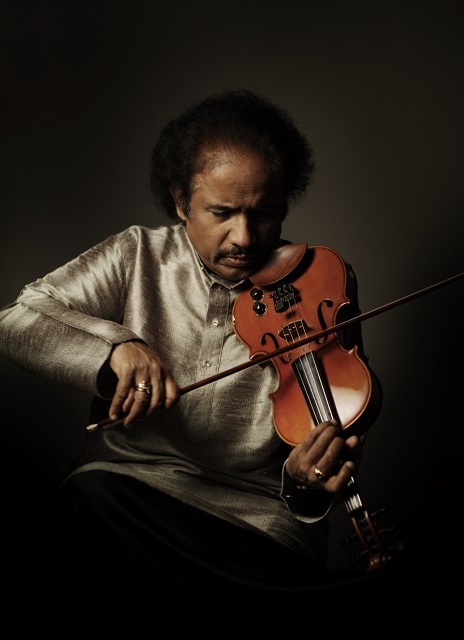Dr. L. Subramaniam is considered one of the most outstanding Indian classical violinists, but he has also established himself as one of the foremost Indian composers in the realm of orchestral music.
He has recorded, played, and composed a variety of music including South Indian Carnatic, Western classical, jazz, world fusion, and world music. We spoke with Subramaniam about his masterful intersection of Indian and Western music, his many artistic collaborations, and his upcoming performance of Shanti Priya with the Chicago Sinfonietta.
 Is the violin a western instrument adapted for Indian classical music? If so, what are the features of it that make it well suited to that purpose?
Is the violin a western instrument adapted for Indian classical music? If so, what are the features of it that make it well suited to that purpose?
There have always been many stringed and bowed instruments in Indian music, but the violin came in during the British rule. It was eventually adapted into Indian classical music because it was well-suited to accompany the human voice. At a time when there were no mics, it was especially useful to have an instrument whose volume could match the singer’s. The violin has no frets, which made it easier to slide a bow across it smoothly. This also meant the instrumentalist could sustain a note as long as they wanted.
For these reasons, the violin was and continues to be the primary accompanying instrument in Carnatic music. In the early 20th century, my father, Professor V. Lakshminarayana, introduced a technique that violinists could use to play solo; he developed different methods that made the violin stand out as distinct from the singer’s voice while still retaining its voice-like qualities.
What are the main characteristics of Carnatic music tradition, and how are they applied to Western orchestras?
The two most important concepts of Carnatic music are raga and tala; each raga is based on a scale and each tala is a rhythmic cycle or time signature. Possibly the most identifiable aspect of Carnatic music, however, are the slides we use (called gamakas). Each raga has its own gamaka, or ornamentations. The challenge is to take these elements and use it in an orchestral context while also maintaining the individuality of a symphony orchestra.
The idea here is not to make an orchestra play Indian music, but to create something where both Western and Indian musicians feel like they’re playing their own music while creating something unique. With this context, we combine elements of Carnatic music with parts of Western classical music (like harmony and counterpoint) to build something entirely original.
What makes an artist someone who you want to work with?
The artist’s music should be something I enjoy for what it is. Second, they should be open to trying new things. In a new collaboration, it is natural to have to step out of your comfort zone and experiment a little. I need to know that the musicians I’m working with are receptive enough to new and exciting ideas going forward, as I certainly will be.
 Shanti Priya is a violin concerto for peace and harmony. In what way are you conveying that message?
Shanti Priya is a violin concerto for peace and harmony. In what way are you conveying that message?
The words “shanti priya” mean “lover of peace,” and that mood is brought in throughout the piece. The first and second movements are meditative in their approach, and the scales we have chosen reflect that. The third movement is an upbeat piece, but it retains an uplifting theme even though there are many fast and virtuosic passages. No part of the piece is brash or aggressive in its approach, and that was something I was careful to convey.
You’ll be performing Shanti Priya in the Chicago Sinfonietta concert that celebrates Diwali. How are Shanti Priya‘s themes reflective of the holiday’s meaning and what can Western audiences take from that?
Diwali celebrates the triumph of light over darkness and knowledge over ignorance. Every festival is a celebration of the gift of life itself. This piece has meditative, contemplative passages as well as more upbeat, celebratory ones. I hope a Western audience can find the essence of our festivals in this piece; a blend of reflection, prayer, and celebration.
—Don Macica, contributing writer
Dr. Subramaniam will be performing his concerto Shanti Priya on the Sinfonietta’s Diwali concert, Love + Light. Get your tickets here!
